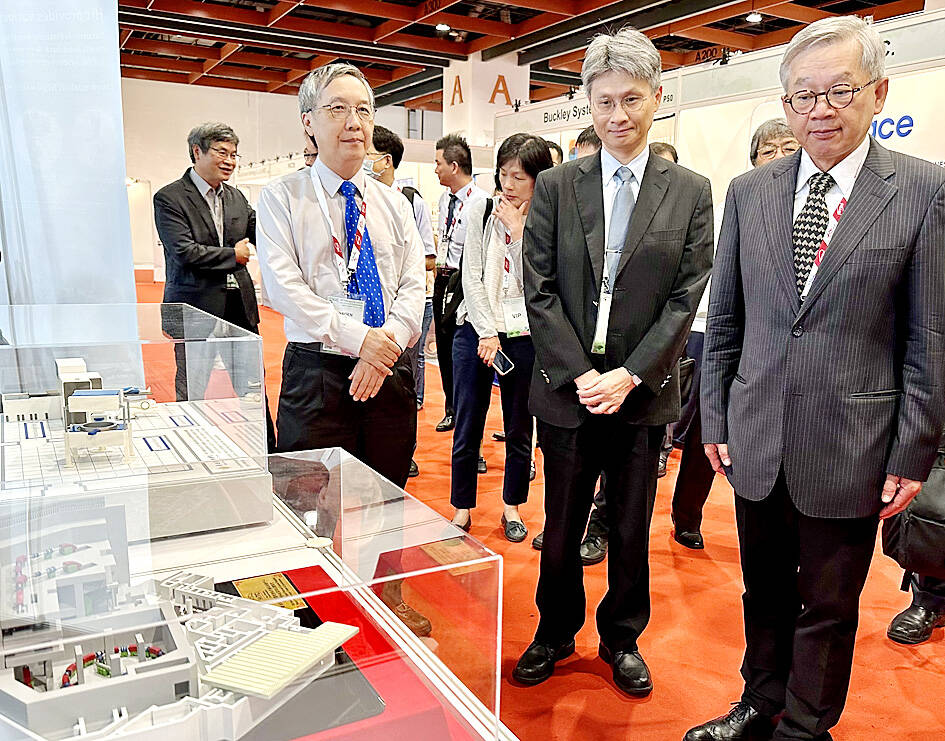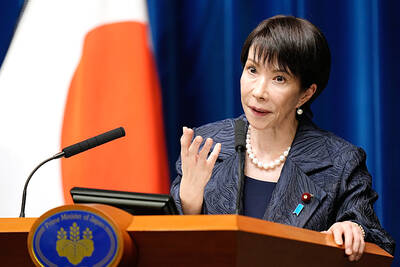Taiwan has developed strong R&D capabilities in particle accelerators that have been innovatively applied to many fields, National Science and Technology Council (NSTC) head Wu Cheng-wen (吳誠文) said yesterday at a conference in Taipei.
Speaking at the International Particle Accelerator Conference (IPAC’25), which Taiwan is hosting for the first time, Wu said particle accelerators were an indispensable cornerstone of modern scientific development.
In Taiwan, Wu said, accelerator technology has expanded into various innovative application fields such as medical diagnosis and therapies, drug development, and energy innovation, though he did not go into further details on the advances made.

Photo: CNA
But according to the National Synchrotron Radiation Research Center (NSRRC), a nonprofit research institute funded by the NSTC, IPAC’25 highlighted Taiwan’s over 30 years of accumulated R&D strength in synchrotron radiation and accelerator technology.
Several medical institutions have already applied accelerator technology in proton and heavy ion cancer therapies, indicative of Taiwan’s achievements in both scientific research and the commercial development of particle accelerators, the NSRRC said in a statement.
The NSRRC further noted that Taiwan is home to internationally significant large-scale particle accelerators, such as the "Taiwan Light Source" and the "Taiwan Photon Source," both operated by the center.
These facilities serve as powerful tools for cutting-edge fundamental research in fields like physics, chemistry, materials science, and biomedicine, while also contributing to precision medicine and semiconductors, it said.
Many of those technologies were on display at the show, with Taipei Veterans General Hospital, for instance, presenting a model of its Heavy Ion Therapy Center and explaining the types of tumors suitable for heavy ion treatment.
The IPAC is one of the largest and most influential international conferences in the field of particle accelerators. Since 2010, it has been hosted annually on a rotating basis among Asia, Europe, and the Americas.
IPAC’25 has attracted nearly 1,000 scholars and experts and more than 70 companies in the field of particle accelerators. The event will feature more than 80 keynote speeches and technical seminars as well as more than 1,000 poster presentations.
It is being held from June 1-6 at the Taipei International Convention Center.

The Ministry of Foreign Affairs (MOFA) yesterday voiced dissatisfaction with the Comprehensive and Progressive Agreement for Trans- Pacific Partnership (CPTPP), whose latest meeting, concluded earlier the same day, appeared not to address the country’s application. In a statement, MOFA said the CPTPP commission had "once again failed to fairly process Taiwan’s application," attributing the inaction to the bloc’s "succumbing to political pressure," without elaborating. Taiwan submitted its CPTPP application under the name "Separate Customs Territory of Taiwan, Penghu, Kinmen and Matsu" on Sept. 22, 2021 -- less than a week after China

THE GOOD WORD: More than 100 colleges on both sides of the Pacific will work together to bring students to Taiwan so they can learn Mandarin where it is spoken A total of 102 universities from Taiwan and the US are collaborating in a push to promote Taiwan as the first-choice place to learn Mandarin, with seven Mandarin learning centers stood up in the US to train and support teachers, the Foundation for International Cooperation in Higher Education of Taiwan (FICHET) said. At the annual convention of the American Council on the Teaching of Foreign Languages held over the weekend in New Orleans, Louisiana, a Taiwan Pavilion was jointly run by 17 representative teams from the FICHET, the Overseas Community Affairs Council, the Steering Committee for the Test of Proficiency-Huayu, the

A home-style restaurant opened by a Taiwanese woman in Quezon City in Metro Manila has been featured in the first-ever Michelin Guide honoring exceptional restaurants in the Philippines. The restaurant, Fong Wei Wu (豐味屋), was one of 74 eateries to receive a “Michelin Selected” honor in the guide, while one restaurant received two Michelin stars, eight received one star and 25 were awarded a “Bib Gourmand.” The guide, which was limited to restaurants in Metro Manila and Cebu, was published on Oct. 30. In an interview, Feng Wei Wu’s owner and chef, Linda, said that as a restaurateur in her 60s, receiving an

MORE RETALIATION: China would adopt a long-term pressure strategy to prevent other countries or future prime ministers following in Sanae Takaichi’s steps, an academic said Taiwan should maintain communications with Japan, as Japanese Prime Minister Sanae Takaichi is to lead a revision of security documents, Taiwanese academics said yesterday. Tensions have risen between Japan and China over remarks by Takaichi earlier this month that the use of force against Taiwan would constitute a “survival-threatening situation” for Japan. Prospect Foundation president Lai I-chung (賴怡忠) yesterday said Takaichi’s stance regarding Taiwan is the same as past Japanese prime ministers, but her position is clearer than that of her predecessors Fumio Kishida and Shigeru Ishiba. Although Japan views a “Taiwan contingency” as a “survival-threatening situation,” which would allow its military to